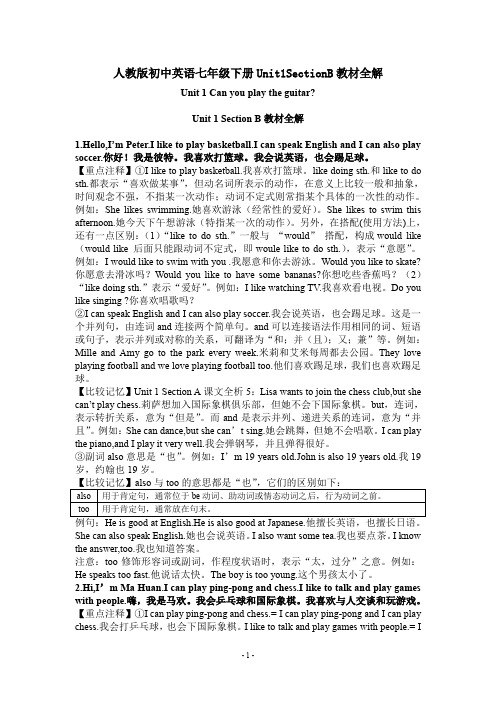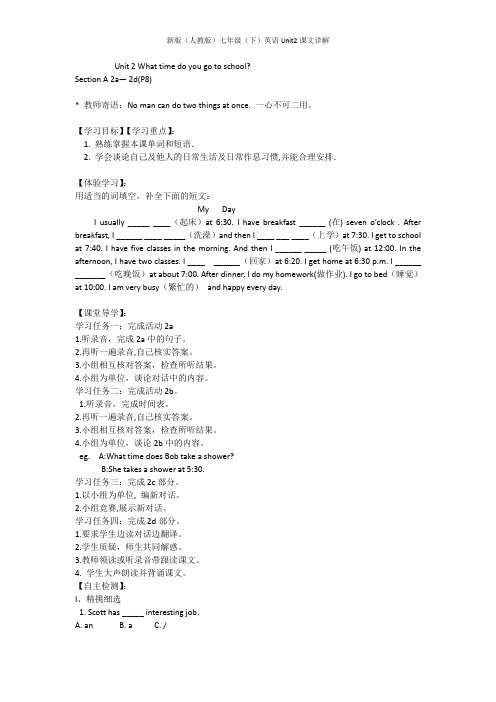(word完整版)人教版初中英语七年级下册Unit2SectionB教材全解
Unit2SectionB词汇讲解课件2021-2022学年人教版英语七年级下册

我们应该每天锻炼身体。 We should take exercise every day. 我们经常在英语课上做练习。 We often do exercises in English class.
exercise的一词多义:
•do/take exercise •做运动;锻炼 •do eye exercises •做眼保健操 •do math exercises •做数学练习题
quarter n. 一刻钟;四分之一
他一刻钟以后到达了。 He arrived after a quarter. 地球(表面)约四分之三被水覆盖。 About three quarters of the earth is covered with water.
quarter的一词多义:
一刻钟
四分之一
• either... or...连接两个名词或代词作主语时,谓语动词应该与离其最近 的那个名词或代词在人称和数上保持一致,也就是遵循“ 就近原则”。 Either you or your sister has to stay at home. 要么你,要么你妹妹必须待 在家里。
• 与your sister(保持数的一致) • either还可作副词,意为“也”,用在否定句的末尾。
•人教版英语七年级下 册Unit 2 Section B 词汇讲解
exercise v.& n.锻炼;练习
• exercise在此处作动词,意为“锻炼”。 • 我的爷爷奶奶天天锻炼身体。 • My grandparents exercise every day. • exercise还可作名词,常见用法如下: • 不可数名词 • 表示“锻炼;运动”,常和take, do, get等词连用 • 可数名词 • 表示“一套动作”或“练习,习题”,如do morning exercises做早操
(完整版)人教版初中英语七年级下册Unit1SectionB教材全解

人教版初中英语七年级下册Unit1SectionB教材全解Unit 1 Can you play the guitar?Unit 1 Section B教材全解1.Hello,I’m Peter.I like to play basketball.I can speak English and I can also play soccer.你好!我是彼特。
我喜欢打篮球。
我会说英语,也会踢足球。
【重点注释】①I like to play basketball.我喜欢打篮球。
like doing sth.和like to do sth.都表示“喜欢做某事”,但动名词所表示的动作,在意义上比较一般和抽象,时间观念不强,不指某一次动作;动词不定式则常指某个具体的一次性的动作。
例如:She likes swimming.她喜欢游泳(经常性的爱好)。
She likes to swim this afternoon.她今天下午想游泳(特指某一次的动作)。
另外,在搭配(使用方法)上,还有一点区别:(1)“like to do sth.”一般与“would”搭配,构成would like (would like 后面只能跟动词不定式,即woule like to do sth.),表示“意愿”。
例如:I would like to swim with you .我愿意和你去游泳。
Would you like to skate? 你愿意去滑冰吗?Would you like to have some bananas?你想吃些香蕉吗?(2)“like doing sth.”表示“爱好”。
例如:I like watching TV.我喜欢看电视。
Do you like singing ?你喜欢唱歌吗?②I can speak English and I can also play soccer.我会说英语,也会踢足球。
初中英语七年级下册 Unit 2 Section B 2b 参考译文

初中英语七年级下册U n i t2 S e c t i o n B2b参考译文(总1页)--本页仅作预览文档封面,使用时请删除本页--初中英语七年级下册 Unit 2 Section B 2b 参考译文1. Do you know what a resolution is It's a kind of promise. Most of the time, we make promises to other people. (“Mom, I promise I'm going to tidy my room when I get back fro m school.”) However, promises you make to yourself are resolutions, and the most common kind is New Year's resolutions. The start of the year is often a time for making resolutions. When we make resolutions at the beginning of the year, we hope that we are going to improve our lives. Some people write down their resolutions and plans for the coming year. This helps them to remember their resolutions. Others tell their family and friends about their wishes and plans.1.你知道决心是什么吗?它是一种承诺。
大多时候,我们都给别人许诺。
(“妈妈,我保证放学后整理我的房间。
”)可是,你给自己许下的诺言就是决心,而且最常见的一种是新年时下的决心。
Unit2SectionB3aSelfCheck课件人教版七年级英语下册2

Self check
A taste clean have get take brush
B your teeth my room
a walk good dressed a good job
用你组成的短语补全句子,完成教材上Self Check中的第 一部分。
1. Ice-cream usually t_a_s_t_e_s__g_o_o_d_ so students like to eat it after school.
B:S__h_e_u_s_u_a_l_ly__g_e_ts_u__p_a_t_5_:_4_5__in__th_e__m__o_rn__in_g____. (5:45)
A:W__h__y_d_o_e_s_s_h_e__g_et__u_p_s_o__e_a_rl_y____? (why/get up/so early)
One possible version
I have a healthy life. I usually get up at seven. I exercise from a quarter past seven to half past seven. Then I have breakfast and brush my teeth. I go to school at eight o’clock. I have lunch at twelve o’clock. I get home from school at half past four and do my homework. I have dinner at six then I watch TV. I go to bed at nine thirty.
七年级-人教版-英语-下册-Unit-2-Section-B-(1a-1e)

Listen and answer.
1.Who is talking about his day? Tom.
2.Does he get up early? When does he get up? Yes. He usually gets up at about half past five.
3.When does he exercise, in the morning or in the evening? In the morning.
Read after 1d.
I=Interviewer T=Tom
I: Tom, I want to know about your day. T: OK. I: When do you get up? T: When do I get up? Hmm. Usually about half past five. Then I run
Classify (分类) the phrases of 1c and add more.
起居
饮食就餐
学习
家务
运动休闲
get up
eat breakfast do my
go to bed
eat dinner homework
go to school eat lunch
go home
take a shower
1:30 half past one 8:05 five past eight
4:55 five to five
6:45 one quarter to seven 3:15 one quarter past three
Tell the time in two ways.
6:40 _s_i_x_f_o_r_ty_/_tw__e_n_ty__to__se_v_e_n_________________________ 6:15 _s_i_x_f_if_t_e_en_/_f_if_te_e_n__p_a_st_s_i_x________________________ 7:26 _s_e_v_e_n_t_w_e_n_t_y_-_si_x_/t_w_e_n_t_y_-_si_x_p_a_s_t_s_e_v_e_n_____________ 7:45 _s_e_v_e_n__fo_r_ty_-_f_iv_e_/_a_q_u_a_r_te_r_t_o_e_i_g_h_t_________________ 8:30 _e_i_g_h_t_th_i_r_ty_/_h_a_lf_p_a_s_t_e_i_g_h_t _______________________ 10:55 _t_e_n_f_i_ft_y_-_fi_v_e_/f_iv_e__to__e_le_v_e_n_______________________ 12:05 _t_w_e_l_v_e_f_i_v_e/_f_iv_e__p_as_t_t_w_e_l_v_e______________________
新版(人教版)七年级(下)英语Unit2课文详解

Unit 2 What time do you go to school?Section A 2a— 2d(P8)* 教师寄语:No man can do two things at once. 一心不可二用。
【学习目标】【学习重点】:1. 熟练掌握本课单词和短语.2. 学会谈论自己及他人的日常生活及日常作息习惯,并能合理安排.【体验学习】:用适当的词填空,补全下面的短文:My DayI usually _____ ____(起床)at 6:30. I have breakfast ______ (在) seven o’clock . After breakfast, I ______ ____ _____(洗澡)and then I ____ ___ ____(上学)at 7:30. I get to school at 7:40. I have five classes in the morning. And then I ______ _____ (吃午饭) at 12:00. In the afternoon, I have two classes. I ____ ______(回家)at 6:20. I get home at 6:30 p.m. I ______ _______(吃晚饭)at about 7:00. After dinner, I do my homework(做作业). I go to bed(睡觉)at 10:00. I am very busy(繁忙的)and happy every day.【课堂导学】:学习任务一:完成活动2a1.听录音,完成2a中的句子。
2.再听一遍录音,自己核实答案。
3.小组相互核对答案,检查所听结果。
4.小组为单位,谈论对话中的内容。
学习任务二:完成活动2b。
1.听录音,完成时间表。
2.再听一遍录音,自己核实答案。
3.小组相互核对答案,检查所听结果。
人教版英语七年级下册Unit 2 Section B教材全解知识点课件

• go to work:去上班,固定结构。
go + to(+冠词)+名词:既可表示参加音乐会、聚会、会议等, 也可
表示去做某事。
例:go to the party 参加聚会
go to school 去上学
• go的相关短语:
go home
回家
go on
继续;发生
go back
返回
go shopping 去购物
课前复习
• when & what time引导的特殊疑问句 when和what time都可以用来询问时间,二者在使用时 要注意以下几点: 3)询问事情发生的年份、月份、日期以及上午、下午 或晚上等非钟点性时间时,只能用when。如:
— When did the story happen? — On the morning of March 18, 2015.
课中讲解 二 Passage
Hi! I’m Tony. I don’t like to get up early. In the morning, I get up at eight. Then I go to school at eight thirty. I don’t have much time for breakfast, so I usually eat very quickly. For lunch, I usually eat hamburgers. After school, I sometimes play basketball for half an hour. • 频率副词的用法 often “常常, 经常”,不如usually那么频繁,表示动作重复,中间 有间断。
• go to work:去上班,固定结构。
人教版英语七年级下册Unit 2 Section B 2a-2c 课件

go to bed early__ √ eat ice-cream __
eat quickly __
play sports __√ eat vegetables __ √ take a walk __ √
Circle the healthy activities
2b 判断正(T)误(F)
( F)1.Tony likes to get up early. ( T)2.Tony goes to school at half past eight. ( F)3.Mary usually gets up at six. ( F)4.Mary never eats ice-cream after dinner. ( F)5.Tony and Mary go to bed at 10:00.
3. A: When does Jim do__(h_i_s_)_h_o_m__e_w_o_r_k?
B: He usuallyd_o_es__ his h__o_m_e_w__o_rk_ at __ _a__q_u_a_rt_e_retioght in the __e_v_e_n_in_g.
4. A: When does Eric _t_a_k_e_a w__a_lk_?
2. I either watch TV or play computer games.
Revision
Ask and answer.
A: Can you say the time in the three ways? B: Yes/No. A: What time is it? B: It’s ...
学习目标
重点单词: quickly, either, lot, sometimes, taste. 重点短语: either…or…,be good for, lots of. 重点句式: 1.I don’t have much time for breakfast, so I usually eat very quickly.
- 1、下载文档前请自行甄别文档内容的完整性,平台不提供额外的编辑、内容补充、找答案等附加服务。
- 2、"仅部分预览"的文档,不可在线预览部分如存在完整性等问题,可反馈申请退款(可完整预览的文档不适用该条件!)。
- 3、如文档侵犯您的权益,请联系客服反馈,我们会尽快为您处理(人工客服工作时间:9:00-18:30)。
人教版初中英语七年级下册Unit2SectionB教材全解Unit 2 What time do you go to school?Unit 2 Section B教材全解1.half past six in the morning早上六点半【重点注释】①half作为名词或代词,意为“一半,半数”,是可数名词,其复数形式是halves。
例如:Please cut the apple in half.请把这个苹果切成两半。
Half of ten is five.十的一半是五。
Cut the apple into halves.把苹果切成两半。
【拓展记忆】表示“某物的一半”用“half a (an)+单数名词”结构。
例如:half an hour半小时half a kilo半公斤half an orange半个橘子②past作介词,意为“(在时间、地点、范围上)超过”。
例如:half past two两点半ten(minutes) past six六点十分It’s twenty past seven.现在是七点二十分。
The hospital is about a mile past the school.医院在过了学校的一公里处。
【拓展记忆】past作介词时,还可表示“超过(某年龄)”。
例如:an old man past seventy七十多岁的老人2.a quarter past three in the afternoon在下午三点十五(三点一刻)a quarter to seven in the evening在晚上六点四十五(七点差一刻).【重点注释】①quarter作名词,意为“一刻钟;四分之一”,a/one quarter“一刻钟;四分之一”;three quarters =three fourths四分之三。
例如:Please wait for a quarter.请等一刻钟。
There are four of us,so wo cut the orange into quarters and each eats a piece.我们共有四个人,因此我们吧橘子切成四等份,每人吃一份。
②to作介词,意为“(在时间上)差”,“(几点)差(几分)”,结构是:分钟数(超过30分钟,即分钟数>30分钟)+to+整点(整点+1),意思是“几点差几分(几点零多少分钟)”。
例如:six to five 四点五十四分(五点差六分)【比较记忆】past 与to表示时间:①用past(过,超过)表示时间时,有三种表达法:1)half past+整点,表示“几点半”。
例如:half past nine/eleven/three九点/十一点/三点半2)分钟数(不超过30分钟,即分钟数<30分钟;如果=30分钟,要用half past+整点;如果分钟数>30分钟,不能用past而要用to“差”来表示)+past+整点,意思是“几点(过)几分”。
例如:ten past ten十点十分two past two两点零二分twenty-five past eight八点二十五分fifteen(a quarter)past four四点十五3)a quarter past +整点,表示“几点(过)一刻”。
例如:a quarter past three 三点一刻(三点十五分)a quarter past nine九点过一刻(九点十五分)②用to(差,不到)表示时间时,有两种表达法:1)分钟数(超过30分钟,即分钟数>30分钟;如果=30分钟,要用half past+整点;如果<30分钟,要用分钟数+past+整点,即“几点(过)几分”)+to+整点(点时间+1),表示“几点差几分”。
例如:two to two两点差二分(一点五十八分)thirteen to ten十点差十三分(九点四十七分)five to twelve十二点差五分(十一点五十五分)2)a quarter(正好15分钟)to +整点(整点+1),表示“几点差一刻”。
例如:a quarter to three三点差一刻(二点四十五分)a quarter to eleven十一点差一刻(十点四十五分)注意:有“half past+整点”的说法,但没有“half to+整点”的说法。
【归纳记忆】时间的表达方式:数词用基数词。
①整点表达法:如果时间是整点,可以直接用钟点数或在钟点数后加o’clock来表达。
例如:at six (o’clock)②“钟点数+分钟数”表达法:先说钟点,再说分钟,直接罗列。
例如:five twenty-five③(参见以上【比较记忆】)“分钟数+past/to+钟点数”表达法:30分钟以内,用“分钟数+past +钟点数”表达,例如:5:25;30分钟以上,用“分钟数(60-分钟数)+to+钟点数(下一个钟点数,即钟点数+1)”表达,例如:5:40。
另外,在分钟数中,正好30分钟,用“half past+整点”来表达;正好15分钟,即“几点过一刻,或几点差一刻”用“a quarter past/to+整点”来表达。
3.do homework做家庭作业【重点注释】homework是不可数名词,一般不加冠词。
在词组do homework 中可以使用形容词性物主代词(do one’s homework),也可不用。
例如:He has a lot of homework.他有许多家庭作业。
I do my homework every day.我每天做作业。
He usually does his homework before dinner.他经常晚饭前做作业。
【拓展记忆】housework是不可数名词,指“家务劳动;家务活”。
例如:My mother does housework every day.我妈妈每天都做家务。
4. eat dinner/breakfast吃晚/早饭【重点注释】eat breakfast/lunch/dinner表示“吃早/午/晚饭”,也可以用have来表示“吃”。
例如:Let’s eat/have our dinner.咱们吃饭吧。
It’s time to eat/have breakfast.到吃早饭的时间了(该吃早饭了)。
5.——When do students usually eat dinner?学生们通常什么时候吃晚饭?——They usually eat dinner at a quarter to seven in the evening.他们通常晚上六点四十分吃晚饭。
【重点注释】①本句是由疑问副词when引导的特殊疑问句,when意思是“什么时候,何时”。
例如:——When is your birthday,John?约翰,你的生日是那一天?——My birthday is February6th.我的生日是2月6日。
When do you usually get home?你通常什么时候到家?When can you come?你什么时候能来?②英语钟点时刻的表达方式:1)采用基数词表达时间。
例如:seven thirty7:30 seven fifteen七点十五seven forty-five七点四十五2)采用介词past,to表达时间。
一般说来半个小时以内,常用介词past,表示“几点过几分”;半小时过后,常用介词to,表示“差几分到几点”。
例如:a quarter past eight半点一刻half past 六点半。
twenty-five to five差二十五分五点③AM和PM:AM表示“午前,上午”(午夜12:00后至中午12:00);PM表示“午后,下午”(中午12:00后至午夜12:00前)。
在使用时,常用小写形式am和pm.在美式英语中,使用形式为a.m.和p.m.6. do my homework做我的家庭作业【重点注释】do one’s homeworkyiwei “做某人的家庭作业“。
do作动词,意为“做;干”,指做具体的工作,强调动作、行为。
其后的宾语常常是lesson,work,homework,exercise等。
其中one’s 代表形容词性物主代词,在句中根据前面的主语选用相应的物主代词。
例如:She wants to help his sister do her homewok.他想帮助他妹妹做家庭作业。
He doesn’t do his homework on Sunday.他在星期天不做家庭作业。
注意:do one’s homework中的do充当实义动词,变否定句时,要借助于助动词do或does。
7.clean my room打扫我的房间【重点注释】此处elean是动词,意思是“把……打扫干净”。
例如:She is cleaning the bedroom now.现在他正在打扫卧室。
【拓展记忆】clean还可作形容词,意思是“干净的,清洁的”。
例如:Are your handsclean?你的手干净吗?8.take a walk散步【重点注释】①此处take a walk=have a walk=take/have walks=walk意为“散步”,与have a walk/go for a walk.同义,“take a+名词”表示与该名词意义相关的动作。
take常和名词连用,意为“做……事情”,表示与该名词意义相关的动作。
例如:Let’s take a walk.让我们散步吧。
I want to take a rest.我想休息一下。
Can I have a look?我可以看看吗?【拓展记忆】take表示“乘,坐”某一交通工具。
例如:He takes a bus to go to school every day.他每天乘公共汽车上学。
Mr.Smith often takes a train to work.②walk作可数名词,意为“步行,行走”。
例如:How about going for a wlk(go fora walk“去散步”)?出去散散步,如何?She usually takes a walk after supper.她经常在晚饭后散步。
He took the dog for a walk.他带着狗去散步。
【拓展记忆】1)walk作名词,还可意为“步行的距离”。
例如:The station is ten minutes’walk from my house.车站离我加要步行十分钟2)walk作动词,意为“步行,行走”例如:He walks to school every day.他每天步行去上学。
